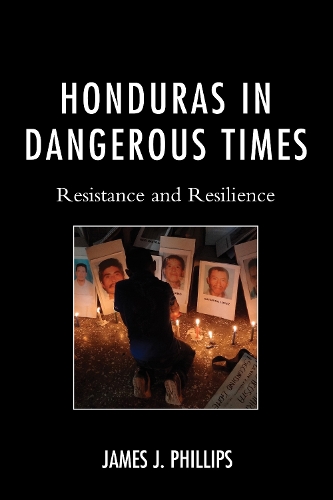
Honduras in Dangerous Times: Resistance and Resilience
(Hardback)
Available Formats
Publishing Details
Honduras in Dangerous Times: Resistance and Resilience
By (Author) James J. Phillips
Bloomsbury Publishing PLC
Lexington Books
16th October 2015
United States
Classifications
Professional and Scholarly
Non Fiction
Political ideologies and movements
Political activism / Political engagement
Social and cultural history
306.097283
Physical Properties
Hardback
290
Width 158mm, Height 239mm, Spine 26mm
562g
Description
Honduras in Dangerous Times: Resistance and Resilience explores how the people of Honduras use cultural resources to resist and to change the conditions of their society, to critique those conditions, and to create the pieces of a better future in the midst of a dangerous present. The book explores ideas and practices which support systems of dominance and submission in Honduras and the ways in which people have slowly developed a broad culture of resistance and resilience. This culture includes struggling for land and environmental preservation against extractive industries, promoting natural local food and sustainable technology to replace foreign agribusiness, bringing a corrupt legal and political system to account by invoking concepts of human rights and laws routinely ignored, bending institutional religion to issues of social justice, and expressing protest and visions of a better society through popular culture. The book highlights the special contribution of the countrys indigenous peoples in resistance; it also discusses the powerful role of the United States in shaping Honduran economic, political, and military life, and what people-to-people solidarity with Hondurans means for citizens of the United States. The book concludes by presenting Honduran popular resistance in a context of late neoliberalism in Honduras and in relation to other Latin American social movements. Honduras in Dangerous Times shows that Hondurans resist in the face of violence and oppression not only because they are resilient, but also that they are resilient because they resist. Resistance keeps hope alive and change possible.
Reviews
Honduras did not receive much media attention until a 2009 military coup removed Manuel Zelayas elected government from power. Since then, the Central American country has been firmly at the forefront of Latin American activist and academic attention. Strong and well-organized popular resistance to the coup altered how many outside observers thought about the country. The resilience of this resistance, however, came as no surprise to anthropologist Phillips, who has accompanied social movements in that country for more than 40 years. In this important and compelling book, Phillips documents a range of Indigenous, religious, cultural, legal, and political forms of resistance to long-standing patterns of exploitation and domination. A final chapter examines US governmental intervention in Honduras, and international people-to-people solidarity movements that counter political and economic interference in the countrys internal affairs. . . .Summing Up: Recommended. All levels/libraries. * CHOICE *
After the 2009 coup dtat in Honduras, the massive oppositional movement that emerged surprised almost everyone. Working with four decades of experience in the country, James Phillips masterfully documents the cultures of resilience and resistance behind the struggle. This book is essential reading for understanding contemporary Central America. -- Mark Anderson, University of California, Santa Cruz
Written with clarity and grace,Honduras in Dangerous Timesdoes a beautiful job of evoking and analyzing social movements in modern Honduras. Phillips takes us deep into the Resistance movement that exploded in response to the 2009 coup, and its back story as well, with an especially rich understanding of the role of religion. At the same time he is able to pull back to larger theoretical questions in an accessible and compelling manner. -- Dana L. Frank, University of California, Santa Cruz
Author Bio
James Phillips is adjunct assistant professor of anthropology and international studies at Southern Oregon University.
